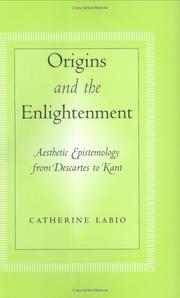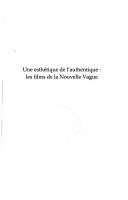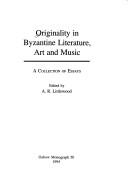| Listing 11 - 17 of 17 | << page >> |
Sort by
|

ISBN: 0801442753 1501727435 Year: 2004 Publisher: Ithaca (N.Y.) : Cornell university press,
Abstract | Keywords | Export | Availability | Bookmark
 Loading...
Loading...Choose an application
- Reference Manager
- EndNote
- RefWorks (Direct export to RefWorks)
Aesthetics --- Theory of knowledge --- anno 1600-1699 --- anno 1700-1799 --- Aesthetics, Modern --- Knowledge, Theory of --- Origin (Philosophy) --- Originality (Aesthetics) --- History --- Philosophy

ISBN: 9782296030268 Year: 2007 Publisher: Paris : L'Harmatten,
Abstract | Keywords | Export | Availability | Bookmark
 Loading...
Loading...Choose an application
- Reference Manager
- EndNote
- RefWorks (Direct export to RefWorks)
New wave films --- Originality (Aesthetics) --- Modernism (Aesthetics) --- Auteurification --- Nouvelle Vague (Cinéma) --- Originalité (Esthétique) --- Modernisme (Esthétique) --- Cinéma d'auteur --- Aesthetics. --- Esthétique

ISBN: 019508344X 9780195083446 1602566240 9781602566248 9780195344776 0195344774 1423734769 9781423734765 1280443553 0197705413 Year: 1996 Publisher: New York Oxford University Press
Abstract | Keywords | Export | Availability | Bookmark
 Loading...
Loading...Choose an application
- Reference Manager
- EndNote
- RefWorks (Direct export to RefWorks)
This work argues that artificial endings in Euripides reinforce innovations in plot and ending. After exploring the playwright's novel closing gestures, the book offers readings of plot, ending and generic innovation in six of Euripides' plays.
Tragedy --- Mythology, Greek, in literature --- Closure (Rhetoric) --- Originality (Aesthetics) --- Rhetoric, Ancient --- Euripides --- Technique --- Mythology, Greek, in literature. --- Originality (Aesthetics). --- Closure (Rhetoric). --- Rhetoric, Ancient. --- Tragedy. --- Technique. --- Ancient rhetoric --- Antieke retoriek --- Conclusion (Rhétorique) --- Endings (Rhetoric) --- Last lines (Rhetoric) --- Oorspronkelijkheid (Esthetica) --- Originaliteit (Esthetica) --- Originalité (Esthétique) --- Peroratie --- Peroration --- Péroration --- Retoriek [Antieke ] --- Retoriek van de Oudheid --- Rhetoric [Ancient ] --- Rhétorique ancienne --- Rhétorique de l'Antiquité --- Slot (Retoriek) --- Drama --- Classical languages --- Greek language --- Greek rhetoric --- Latin language --- Latin rhetoric --- Aesthetics --- Rhetoric --- -Technique --- Ėvripid --- Yūrībīdīs --- Euripide --- Euripedes --- Eŭripido --- Eurypides --- Euripidesu --- אוריפידס --- エウリーピデース --- Εὐριπίδης --- Criticism and interpretation --- Greek drama (Tragedy) --- History and criticism --- Euripides - Technique --- History and criticism. --- Criticism and interpretation.
Book
ISBN: 9781785339394 1785339419 9781785339400 1785339400 1785339397 1785339427 1785339435 Year: 2018 Publisher: New York : Berghahn Books,
Abstract | Keywords | Export | Availability | Bookmark
 Loading...
Loading...Choose an application
- Reference Manager
- EndNote
- RefWorks (Direct export to RefWorks)
Pilgrimage has always had a tendency to follow—and sometimes create—trade routes. This volume explores how wider factors behind transnational and global mobility have impacted on pilgrimage activity across the world, and examines the ways in which pilgrimage relates to migration, diaspora, and political cooperation or conflict across nation-states. Furthermore, it brings together case studies that explore forms of mobility where pilgrimage is juxtaposed, complements, or is in intimate association with other forms of movement.
Ethnicity. --- Group identity. --- Originality (Aesthetics) --- Material culture. --- Cultural Heritage, Heritage Studies, Materiality, Heritage Formation, Cultural Memory, Collective Memory, Aesthetics. --- Ethnicity --- Group identity --- Material culture --- Pilgrims and pilgrimages --- Religion and sociology. --- Anthropology of religion. --- Social aspects --- Anthropology of Pilgrimage, pilgrimage studies, mobility studies, human migration, diaspora, pilgrimage.
Book
ISBN: 9781781682920 9781781682937 9781781682944 1781682925 9781781686614 Year: 2014 Publisher: Brooklyn : Verso
Abstract | Keywords | Export | Availability | Bookmark
 Loading...
Loading...Choose an application
- Reference Manager
- EndNote
- RefWorks (Direct export to RefWorks)
philosophy of art --- ecology --- value [economic concept] --- creativity --- Art --- Postmodernism --- Social values. --- Value. --- Creative ability. --- Creativeness --- Creativity --- Ability --- Creation (Literary, artistic, etc.) --- Standard of value --- Cost --- Economics --- Exchange --- Wealth --- Prices --- Supply and demand --- Values --- Social aspects. --- Originality (Aesthetics) --- Culture --- Cultural policy --- Postmodernisme --- Originalité (Esthétique) --- Politique culturelle --- Valeurs sociales --- Création (Arts) --- Créativité --- Valeurs (Philosophie) --- Philosophy --- Economic aspects --- Aspect social --- Philosophie --- Aspect économique --- Aesthetics of art --- Social values --- Value --- Creative ability --- Social aspects --- artistic change

ISBN: 0946897875 Year: 1995 Volume: 50 Publisher: Oxford : Oxbow books,
Abstract | Keywords | Export | Availability | Bookmark
 Loading...
Loading...Choose an application
- Reference Manager
- EndNote
- RefWorks (Direct export to RefWorks)
Art, Byzantine --- Byzantine literature --- Music, Byzantine --- Originality (Aesthetics) --- Art byzantin --- Littérature byzantine --- Musique byzantine --- Originalité (Esthétique) --- History and criticism --- Histoire et critique --- Byzantine Empire --- Empire byzantin --- Civilization --- Civilisation --- Art, Byzantine. --- Byzantine literature. --- Music, Byzantine. --- Civilization. --- Littérature byzantine --- Originalité (Esthétique) --- Byzantine music --- Music, Greek and Roman --- Greek literature, Byzantine --- Greek literature, Medieval and late --- Greek literature --- Byzantine art --- Art, Medieval --- Christian art and symbolism
Book
ISBN: 9781785331817 1785331817 9781785331831 1785331833 1785331825 Year: 2016 Volume: volume 6 Publisher: New York (N.Y): Berghahn,
Abstract | Keywords | Export | Availability | Bookmark
 Loading...
Loading...Choose an application
- Reference Manager
- EndNote
- RefWorks (Direct export to RefWorks)
In an era of intensifying globalization and transnational connectivity, the dynamics of cultural production and the very notion of creativity are in transition. Exploring creative practices in various settings, the book does not only call attention to the spread of modernist discourses of creativity, from the colonial era to the current obsession with 'innovation' in neo-liberal capitalist cultural politics, but also to the less visible practices of copying, recycling and reproduction that occur as part and parcel of creative improvization.
Creation (Literary, artistic, etc.) --- Originality (Aesthetics) --- Material culture --- Culture and globalization. --- #SBIB:39A5 --- #SBIB:316.7C200 --- Globalization and culture --- Globalization --- Culture --- Folklore --- Technology --- Aesthetics --- Creative ability in art --- Creative ability in literature --- Art --- Imagination --- Inspiration --- Literature --- Creative ability --- Originality --- Social aspects. --- Kunst, habitat, materiële cultuur en ontspanning --- Sociologie van de cultuuruitingen: algemeen --- Creation (Literary, artistic, etc) --- Culture and globalization --- Social aspects --- Creation (Literary, artistic, etc) - Social aspects --- Material culture - Social aspects
| Listing 11 - 17 of 17 | << page >> |
Sort by
|

 Search
Search Feedback
Feedback About UniCat
About UniCat  Help
Help News
News